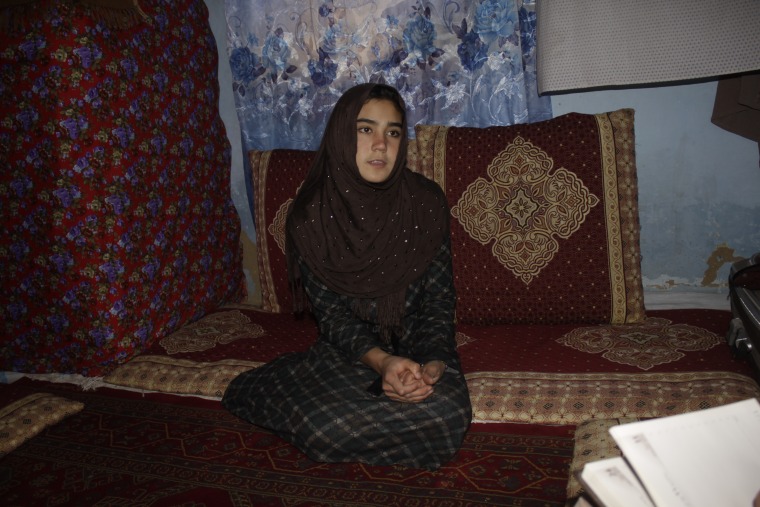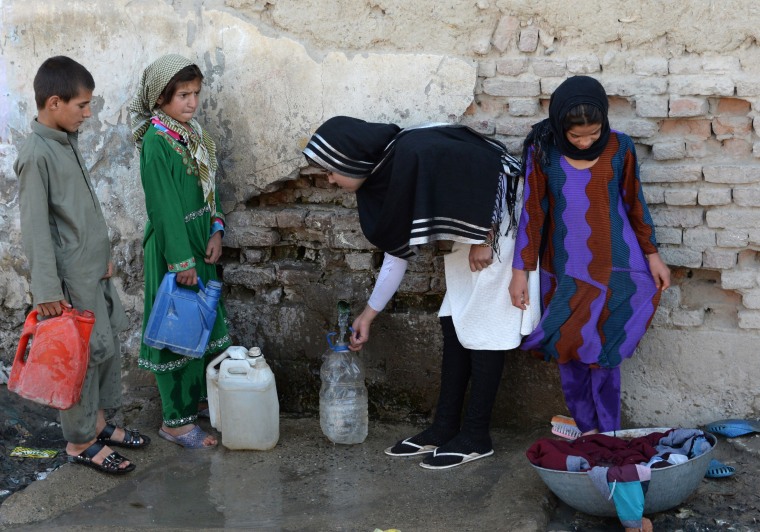KABUL — Guts, grit and grace aptly describe the slight figure sitting on the floor of a mud shack in Afghanistan’s capital.
Aziza Rahimzada has accomplished more in her 14 years than most adults could hope to in their whole lives. Her persistent cajoling helped convince the government to allow children from her encampment without identity documents to attend school.
The soft-spoken teen has raised money to buy school supplies, helped convince community elders to allow kids get an education and successfully lobbied for access to tap water in the area where she and her family live.
“My work is only for kids,” Rahimzada told NBC News in her home, one of a number huts clustered around an abandoned kindergarten. “I will continue to work for them because in Afghanistan children’s rights are violated in all levels.”
After organizing in obscurity for four years, Rahimzada is now one of three children nominated for the International Children’s Peace Prize. It is the same award given to Malala Yousafzai, the Pakistan girl shot in the head by a Taliban gunman after advocating girls' education. This year’s winner will be announced Monday.

“She stands up for children living in appalling conditions in Afghan refugee camps and has encouraged hundreds of other children to talk about their problems and claim their rights,” Netherlands-based aid and advocacy charity Kids Rights said in a statement when Rahimzada was nominated in September.
Despite the plaudits, Rahimzada is matter-of-fact about negotiating Afghanistan’s famously corrupt and ineffective bureaucracy.
“They say only men understand other men’s problems. Likewise, only children understand the problems of other children.”
“We set up a council of children in the camp and we convene the council once a year where all the children in the camp speak about their problems,” she said. “We also have a council of elders in the camp so then I take the children’s problems to the council and the based on that I take the issues to the relevant government agencies and also suggest a solution.”
While Rahimzada easily navigates the world of adults, she maintains that all her efforts have a single aim: to help other children.
In this, she has her work cut out. Grinding poverty and more than three decades of war have left their imprint on the country’s most vulnerable.
Under 60 percent of children attend primary school, and under 35 percent go to secondary school, according to the United Nations. And three-quarters are estimated to have experienced “violent discipline,” the U.N. estimates.
What makes Rahimzada’s accomplishments more striking is that she comes from among the most disadvantaged. The family fled war their native Parwan province 15 years ago their Rahimzada’s brother was killed in violence that has convulsed the country for decades and now they are among the 900,000 classified as Afghanistan’s internally displaced. Her mother is the family’s only breadwinner works as a cook at a school to feed the four children still at home.
Related: Highest Number of Women, Kids Killed, Wounded on Record
“What motivated me was the poverty and lack of education I have experienced in my family,” she said.
Rahimzada’s work has provoked much admiration but also some jealously among those around her, according to Bibi Ameena, a 34-year-old mother-of-four who lives nearby.
“Some people do not like what she does — they are jealous. But I love her, she is a great girl,” she said.
Fellow refugee Rabia simply likes Rahimzada — “a lot.”

“I want to be like her,” the nine-year-old said. “I want to get an education like her and become famous.”
Others clearly agree, and Rahimzada is often mobbed by small girls who hug her and tug on her overcoat when she arrives at school or walks through her camp.
The teen, dubbed "Afghanistan's Malala" by some journalists, takes this in her stride and remains focused on her mission.
“They say only men understand other men’s problems,” she said. “Likewise, only children understand the problems of other children.”

